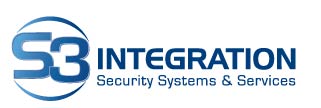
S3 Integration | September Featured Integrator
In September, our industry focus is security in the government and public safety markets. We connected with Mike Simmons, vice president and owner of Baltimore, Maryland based S3 Integration. Simmons talked about the company, his experiences with jobs in the government market, and insight into being an effective security company leader.
Q: How long has S3 Integration been in business?A: We’ve been in business since 1996. In 2004, we changed our name to better indicate our business. It was important for us to have “Integration” in our name.
Q: To date, what has been your most unique or interesting job?A: Our most interesting job was to retrofit an existing Casi-Rusco system to AMAG’s new Casanova solution. The AMAG system would perform the standard access control functions, as well as integrate. However, the client had unusual requirements above and beyond what a normal access control system could perform so we integrated programmable logic controllers (PLC’s) for the timing, people counting, interlocking controls and two man controls and occupancy functions.
This system was unique because a running account of personnel occupying the individual and the production locations had to be monitored with an actual person count. At locations required to have two man control or two man rule requirements the person count would identify locations that did not meet the minimum two person occupancy. In instances when the count was less than the minimum two person occupancy a user defined time sequence would activate. If the occupancy increased to two or more a normal condition would exist. If the occupancy decreased to zero an occupancy detection circuit would activate. If the occupancy one existed beyond the user defined time period an alarm condition would exist. This is not a typical application that we see, and it was an interesting challenge to find and incorporate the right solution.
By integrating PLC’s, we were able to operate independent of the access control system allowing individual location self-monitor counting and timing functions. The PLC’s were integrated with the access control system to provide a common alarm monitoring and control operator interface through the access control system. According to the client, we are the first company to get all of their scenarios working.
Q: How did S3 Integration get started in the government/public safety market?A: Our start in the government market began through one of our defense contractor relationships. We did several projects for various facilities for a major defense contractor in the Baltimore / Washington region. The contractor was impressed with our ability to provide quick, accurate, value based designs for their internal applications, as well as our overall delivery and performance. As a result, they brought us on as a partner to implement the security systems for one of their largest government clients. The security project was located overseas and consisted of numerous system integrations to secure the border of a city, as well as areas within the city. One of the integrations that we provided had never been performed before, which made the project somewhat challenging and rewarding. S3 integration was the last member on the major defense contractor's team and the first team member finished with a complete and working solution. That was our start in the government/public safety market. Since then, government business has become about 25 percent of our business.
Q: What are some of the biggest challenges that integrators are facing in the government/public safety markets?A: The biggest challenge that we see is more of an industry wide challenge not limited to the government market. It’s the balancing act of employing a team of high level, IT savvy technical people while trying to remain price competitive.Today’s technology and today’s clients both require higher level, higher priced IT people to support them, yet the industries margins have deteriorated. It’s a tough balancing act to give clients the talent they demand for the price want it.Q: What makes S3 Integration stand out in the government/public safety market?A: In speaking to many clients about their experiences with their previous service providers, we’ve heard the same common theme, “they didn’t provide good quality service.”What makes S3 Integration stand out is that we’ve recognized the opportunity to be the one company who truly delivers a great customer experience through quality customer service at every touch point the client has with our organization. Consequently, we changed our company tagline three years ago to “Extreme Customer Service with Extreme Professionalism.” This mantra is embedded into every employee of our company and it has served us (and our clients) well.Q: In addition to government/public safety, what other types of clients do you have?A: We have a diverse client portfolio that consists of every major vertical market. Our largest market share comes from education, healthcare, defense contractors, manufacturing, mission critical facilities / power and utility, and technology companies.Q: As the vice president of S3 Integration, what do you think are three qualities that a successful security integration company will have?
A:I think it starts with having knowledgeable, high energy, high quality employees. If you have the right people, the second quality comes by default and that’s providing “Extreme Customer Service,” which unfortunately seems to be somewhat of a dying quality in our industry. The third quality for us, is having a forward thinking management team who continuously evolves the company through innovative and cost effective new technologies that clients can benefit from.It’s my belief that having these qualities separate the “true” system integrators from the “opportunistic” type companies, who tend to be void of these qualities and enter the industry to merely subsidize another core offering but don’t actually possess a sincere passion for security.
Q: What is your advice for leaders who want to enter into the physical security integrator market?A: The security industry has become a very challenging and relatively low margin business to be in. There’s more competition than ever before and the industry has at some level become partially commoditized. So, my first recommendation would be to consider another market. However, if they are committed to the security market, I would recommend that they have, at a minimum, the three qualities I mentioned in the last question. I would also suggest that they walk before they run, meaning don’t go after every opportunity that comes across your desk. Be focused, stay strategic and well targeted to what fits your business and what your company can handle, and grow responsibly from there.

